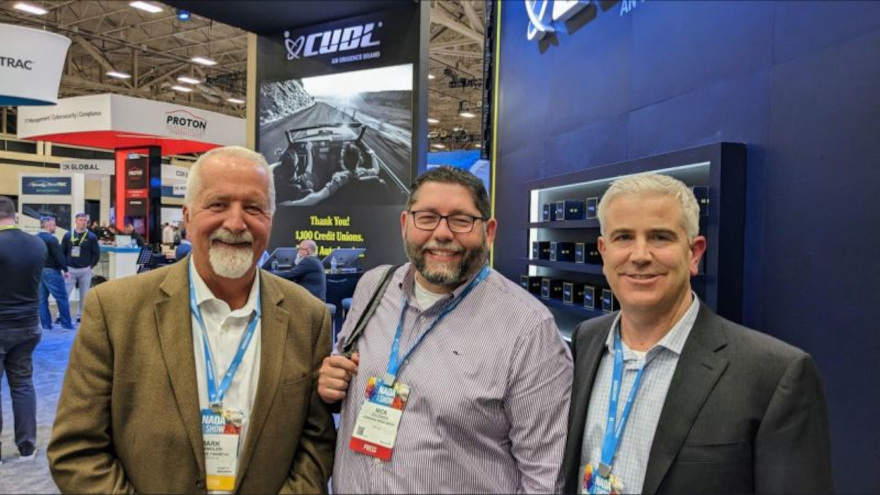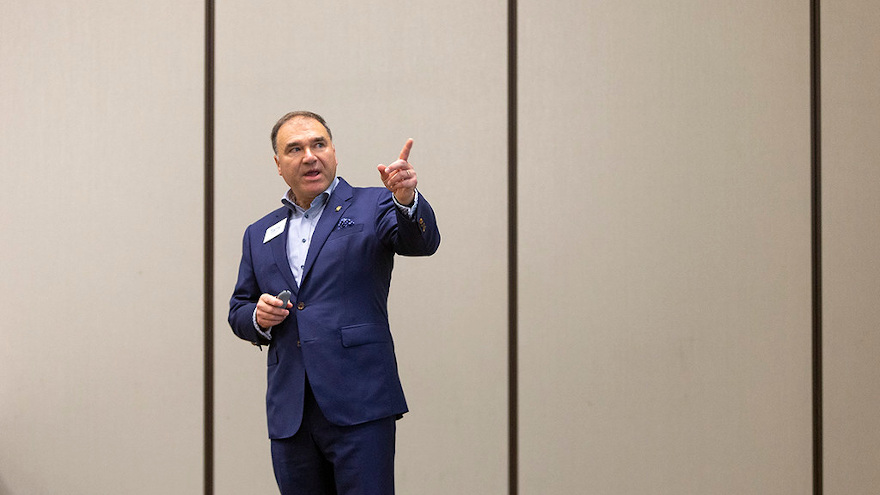Credit Union Leasing of America (CULA) set a new record in 2022 for originations with $2.7 billion in leases, surpassing its single year record of $2 billion set just a year earlier.
According to a news release, the company originated 64,000 leases through its credit union partners in 2022, up from 50,000 in 2021.
In addition, CULA is now originating paper in nine more states, added seven credit unions, and increased the number of participating auto dealers by 42%.
“Leasing has proved to be a powerful short term, low risk, strong yield option that not only gives credit union members more payment flexibility but also, as vehicle prices skyrocket, provides dealers new opportunities to be more competitive by offering their customers a more affordable way to buy cars, while increasing loyalty and CSI,” CULA president Ken Sopp said in the news release.
“Our record 2022 numbers reflect the increasing number of credit unions and auto dealers who, in today’s volatile auto finance environment, are offering consumers the benefits of credit union vehicle leasing,” Sopp continued.
Sopp noted that the percentage of credit unions that participate in vehicle leasing is up nearly 50% because affordable leasing can give shoppers the power of more payment flexibility, while also keeping their vehicle under warranty.
“The alignment between current high interest rates, the absence of incentives by OEMs and captive finance companies, and the high price of vehicles, puts vehicle leasing in the sweet spot of credit union auto finance,” Sopp said.
John Hendrikse, senior vice president of lending at St. Mary’s Credit Union in Marlborough, Mass., said that the institution was not only able to provide members with a vehicle buying alternative, but also effectively grow an auto portfolio at a rate they hadn’t seen in some time.
“With the price of cars continuing to increase, leasing is becoming more prevalent and is now a necessary tool for credit unions to remain competitive in the indirect space,” Hendrikse said in the news release.
Cody Carter is internet sales manager at Tustin Toyota in Southern California who also works with CULA.
“In the current market of high interest rates and low availability, CULA has allowed us to maintain a competitive advantage against our competitors with program options for both new and used car leasing,” Carter said in the news release.
CULA has been a leader in indirect vehicle leasing for credit unions for more than 30 years, providing program assistance, analytics reporting, compliance support, dealer management tools and member services, all supported by customer service and proven systems.
CULA’s understanding of the credit union financial model has resulted in long-term business relationships with top-tier credit unions, including nine of the top 10 credit unions offering leasing in the U.S.
“Indirect vehicle leasing plays an important role, helping break through roadblocks faced by credit unions, dealers and consumers,” Sopp said.
Auto Financial Group (AFG), announced on Tuesday that it has signed an integration agreement with MeridianLink, which provides software platforms for financial institutions and consumer reporting agencies.
AFG said this partnership further reinforces its mission to pursue innovative solutions that help clients streamline their workflows.
With this integration, AFG said its Balloon Lending Program will be even easier to implement for financial institutions using MeridianLink’s loan origination system (LOS).
AFG explained the origination process will be more efficient, and users will not need to toggle between two platforms, increasing productivity and minimizing errors. Information will be updated automatically between both systems, keeping all documentation in sync and up to date, according to a news release.
“With this integration, financial institutions using MeridianLink will be able to originate AFG loans seamlessly, providing a responsive and straightforward solution for customers,” Auto Financial Group CEO Richard Epley said in the news release.
To learn more about AFG’s programs, go to https://www.autofinancialgroup.com/products.
Tarry Shebesta has been involved with the National Vehicle Leasing Association (NVLA) for 22 years.
And during NVLA’s annual conference in Tucson, Ariz., Shebesta was presented with the 2022 Clemens-Pender Lessor of the Year Award, which is the organization’s highest honor.
The Clemens-Pender Lessor of the Year was started in 1977 and is given annually by NVLA. The award was established to memorialize two pioneers of the vehicle leasing industry that formed the early roots of NVLA.
“Frank Pender and Jack Clemens were dedicated, hard-working vehicle lessors who exemplified the highest standards of the industry,” officials said in a news release.
“The award is given to the NVLA member lessor who best exemplifies the highest standards of professional conduct, dedication to the association and industry, hard work, and ethics,” they continued.
After Shebesta joined NVLA in 2000, he was nominated to the board two years later. Then in 2005, he took the reins as president for NVLA’s 40th anniversary year, the first time an Ohio member became president.
Shebesta is NVLA’s longest active serving board member. He’s held multiple board positions, chaired many committees, written industry articles, taught seminars, and helped navigate the organization through the industry crash of 2008.
“I’m honored to receive this prestigious NVLA award and humbled to be in the same company as past honorees,” said Shebesta, who also is CEO of ACS Financial & FinTech. “My passion for bringing innovative solutions to the leasing industry has only been possible with the collaborative efforts of colleagues and fellow board members.“
In 2023, Shebesta is in line again to take the helm as NVLA president.
Complications involving leased vehicles landed GM Financial into actions taken by the Department of Justice.
On Wednesday, the Justice Department announced that GM Financial has agreed to pay more than $3.5 million to resolve allegations that the captive violated the Servicemembers Civil Relief Act (SCRA) by illegally repossessing 71 servicemembers’ vehicles and by improperly denying or mishandling more than 1,000 vehicle lease termination requests.
In a message sent to Cherokee Media Group, GM Financial said, “GM Financial has been fully cooperative and responsive throughout the investigation opened in 2018 by the Department of Justice into compliance with the Servicemember’s Civil Relief Act.
“As announced (Wednesday) by the Department of Justice, we have reached a settlement agreement regarding processing of a subset of SCRA-protected accounts. Over our 30-year history, GM Financial has maintained a strong track record of fair lending practices and compliance with all regulatory requirements. We remain committed to ensuring the customer experience is handled responsibly, ethically and exceeds the customer’s expectation,” the captive said.
According to a news release, the Justice Department began investigating GM Financial after receiving a complaint about a potential violation involving U.S. Army Chief Warrant Officer 3 (CW3) Thomas Gorgeny.
In September 2017, the Justice Department said CW3 Gorgeny received orders to deploy overseas for 10 months and requested that GM Financial allow him to terminate his vehicle lease early pursuant to the SCRA.
Although GM Financial told CW3 Gorgeny that his early termination request was approved and he returned his vehicle to the dealer, months later, while he was deployed overseas, government officials said CW3 Gorgeny received a letter from the captive demanding that he pay more than $15,000 to cover the entire remaining period of the lease, as well as costs associated with the sale of the vehicle.
In a complaint filed in the U.S. District Court for the Northern District of Texas, the Justice Department alleged that, since 2015, GM Financial has improperly denied servicemembers’ lease termination requests, charged servicemembers improper early termination fees or lease amounts after the date of termination, and failed to provide servicemembers timely refunds of lease amounts they paid in advance.
The Justice Department also alleged that GM Financial’s failure to properly handle servicemembers’ lease termination requests resulted in more than 1,000 SCRA violations.
Furthermore, the complaint also alleged that, since 2015, GM Financial has unlawfully repossessed 71 vehicles owned by SCRA-protected servicemembers.
Officials explained the SCRA is a federal law that provides certain legal and financial protections for servicemembers and their families. The law prevents an auto finance or leasing company from repossessing a servicemember’s vehicle without first obtaining a court order, as long as the servicemember made at least one payment on the vehicle before entering military service.
The SCRA also allows servicemembers to terminate a vehicle lease early after entering military service or receiving certain qualifying military orders. If a servicemember terminates a vehicle lease under the SCRA, the leasing company may not impose any early termination charges and must refund, within 30 days, any rent or lease amounts paid in advance, according to the Justice Department.
Under the consent order, GM Financial has agreed to pay $3,534,171 to the affected servicemembers and a $65,480 civil penalty to the United States.
Officials said GM Financial will pay at least $10,000 to each of the 71 servicemembers who had their vehicles unlawfully repossessed.
For the servicemembers who were charged an improper fee when they terminated their vehicle leases, officials said GM Financial will refund the fee and will pay additional damages of three times the fee or $500, whichever is greater. Servicemembers whose requests to terminate their vehicle leases were improperly denied will receive a refund of certain payments plus up to $5,000 in additional damages, according to the Justice Department.
The order also requires GM Financial to repair the servicemembers’ credit, provide SCRA training to its employees, and implement policies and procedures that comply with the SCRA.
“Members of our Armed Forces should not have to suffer financial hardship as a result of their service to our nation,” said Assistant Attorney General Kristen Clarke of the Justice Department’s Civil Rights Division.
“The Civil Rights Division remains steadfast in its commitment to enforcing laws that safeguard the rights of our servicemembers so that they can devote their energy and attention to the defense of our country,” Clarke continued in the news release.
“The last thing servicemembers should be worried about while deployed is paying off vehicle leases they don’t want and can’t use,” added U.S. Attorney Chad Meacham for the Northern District of Texas. “As members of our armed forces put their lives on the line for our country, we are determined to protect their rights here at home.”
Likely curtailed by the lack of inventory and escalating prices, Experian reported this week that leasing decreased to 19.65% of new vehicles delivered during the second quarter, down from 27.82% in Q2 of last year.
Despite the overall softening, Experian’s State of the Automotive Finance Market Report: Q2 2022 still contained more intriguing data about the leasing segment, including …
Read more
Last week, Lease End, a leading online platform empowering consumers to take control of their end-of-lease options, announced a new financing partnership with TD Bank.
According to a news release, the partnership will scale Lease End’s digital financing options and allow more lessees to buy out their vehicle.
“Too often, lessees are given limited options with how to handle their vehicle. We’re looking to change that for our customers and providing the widest array of financing options to meet their needs is part of that mission,” Lease End co-founder and chief executive officer Brandon Williams said in the news release.
“TD Bank was an obvious choice to help implement our vision of an effective and convenient digital financing experience and maintain our growth trajectory. We’re excited to partner with them,” Williams continued.
Lease End provides technology that allows for customers to quickly exit their lease and take control of the equity in their vehicle — all through an online platform.
This newest partnership is a key moment for Lease End, as a growing customer base requires collaboration with organizations that are also committed to streamlined processes and high transaction volume.
Additionally, TD Bank’s support of eSignatures and online contracts is critical to transitioning customers to a digital car finance experience and away from a traditional dealership, particularly for leases.
In less than one year since launching its fully online lease buyout platform, Lease End said it has doubled customer volume every six months.
The platform can connect a lessee looking to buy out their leased vehicle with competitive funding options like TD Bank. This allows clients to choose the financing and interest terms that best suit their needs rather than being locked into a manufacturer financing program.
Lease End also offers customers options like vehicle service contracts (VSC) and guaranteed asset protection (GAP) insurance.
Or, for customers looking to sell their leased vehicles, Lease End provides an online-only experience that gets eligible customers out of their leases without an in-person inspection.
For more information, visit: https://www.leaseend.com.
More than 35 credit unions already use the platform fueled by Credit Union Leasing of America (CULA), and the service provider grew its client base this week by adding Affinity Federal Credit Union.
Initially, Affinity plans to offer this leasing opportunity to New Jersey members and local dealerships, with plans to expand the indirect leasing program to New York and Pennsylvania.
Affinity ranks in the top 2% of all credit unions in the U.S., according to data compiled by the National Credit Union Administration, and has more than 20 branches in New Jersey, New York and Connecticut.
“Affinity’s mission is to support our members’ financial well-being and to work closely with them to achieve their financial goals,” Affinity senior vice president of lending Kathleen Metz said in a news release. “We recognize that car ownership is increasingly difficult in today’s climate, with record-high prices and low inventories presenting heightened challenges for interested buyers.
“CULA is an industry leader and shares our commitment to superior member service. We’re excited to extend this new offering to our members and dealer partners,” Metz continued.
CULA offers an analytically driven, high-value leasing program and handles the intricacies of leasing for its clients, including analytics, insurance, operations, compliance and more.
“Our partnership provides direct benefit to our members and team members, alike. The new CULA Plus Program handles even more of the lease end responsibilities and will allow for an efficient, streamlined and positive experience for our team, while boosting the member experience,” said Marisa Manning, who is indirect operations manager at Affinity.
According to Experian’s State of the Automotive Finance Market, credit unions amassed 22.06% of the total auto finance market during the first quarter, up from 18.55% year-over-year.
“New Jersey is one of the most important vehicle-leasing markets in the U.S., and we are proud to further expand our credit union reach in New Jersey — as well as in New York and Pennsylvania — with the forward-thinking team at Affinity,”, CULA’s vice president of business development Mark Chandler said in the news release.
“There is a significant opportunity for credit unions who offer vehicle leasing in the current economic climate, and we are pleased to help Affinity meet this moment. Our program is designed to enhance membership and yield, while helping to diversify service portfolios,” Chandler continued.
CULA, working with its credit union partners, originated 50,000 leases worth $2 billion in 2021, a single year record.
During the first six months of 2022, CULA said it has already grown by 50% year-over-year, and is on pace to see even better results for the full year. The company has nearly tripled its portfolio in five years to $5 billion and currently offers leasing through credit unions in 20 states.
“It is so gratifying to see our credit union partners achieving such impressive results as they help their members into vehicles in the current economic climate. We have no doubt that Affinity, with its focus on serving the needs of its members, will prove to be one of our most successful partners,” Chandler concluded.
The newest partner of Credit Union Leasing of America (CULA) is familiar of what it’s like to be a champion.
CULA recently announced it is now partnering with UNIFY Financial Credit Union (UNIFY), the official credit union of the 2022 NFL champion Los Angeles Rams.
Working together, UNIFY now has successfully launched its indirect vehicle leasing program in Southern California. The partnership extends CULA’s portfolio of credit union vehicle leasing in Los Angeles and Orange counties, while expanding access to the affordability and flexibility of leasing to UNIFY’s members in Southern California.
According to a news release, CULA and UNIFY plan to expand the program to other states and regions where UNIFY operates.
UNIFY is one of the nation’s leading credit unions, with more than $4.2 billion in assets and more than 271,000 members across the country.
Recently, UNIFY became the first credit union to offer cryptocurrency services, enabling its members to buy, sell and hold bitcoin alongside their traditional accounts within its online banking platform.
“We are pleased to work with CULA to offer vehicle leasing to our members in the very important Southern California car market. With vehicle prices at record highs, giving our members access to the lower payments that leasing can offer has never been more important,” UNIFY chief executive officer Gordon Howe said in a news release.
“Meeting our members’ evolving needs in today’s economic climate is job number one for us. Partnering with a company with a 34-year history of leadership in the indirect vehicle leasing space gives us every confidence that our members will be very well served,” Howe continued.
CULA powers indirect vehicle leasing for credit unions with its analytically driven, high-value leasing program that handles the intricacies of leasing for its clients, including analytics, insurance, operations, compliance and more.
CULA highlighted that it is a trusted partner to many of the industry’s most innovative credit unions, including nine of the top 10 credit unions offering leasing in the U.S.
“UNIFY is one of the most prominent and forward-thinking credit unions in the country, and we are excited to add them to our growing list of credit union partners as they continue to look for ways to best serve their members, and to stay on the cutting edge of financial service,” CULA vice president of business development. Mark Chandler said in the news release.
“With current manufacturer leasing incentives suppressed, today’s credit unions have a unique opportunity to gain market share with vehicle leasing, while also offering a money-saving alternative for their members who want or need to get into a car in the current market. We are proud to help UNIFY do just that,” Chandler went on to say.
Chandler noted that by adding UNIFY to its roster of clients, dealers in the Southern California area have even more options for offering leasing to their customers.
“We have been inspired that our credit union and dealer partners are seeing great results as they work with customers who choose to lease,” he added.
CULA has recently experienced dramatic growth working with its credit union partners.
In January, the company announced $2 billion in lease originations in 2021, a single year record. The company has nearly tripled its portfolio in five years to $3.8 billion and currently offers leasing through credit unions in 17 states.
More than 30 credit unions are currently active on CULA’s innovative leasing platform.
“CULA’s expertise is in vehicle leasing for credit unions, and offers an analytically driven, high-value leasing program supported by stellar customer service and proven systems, all with a focus on helping credit unions meet their financial and membership goals, improve yield and diversify their portfolios,” the company said.
Freedonia Focus Reports and Kelley Blue Book shared more data and projections about vehicle leasing and new-model prices.
Freedonia Focus Reports said that U.S. consumer spending on vehicle leases is forecast to rise 1.3% per year in nominal dollars through 2025. Analysts explained that increased consumer leasing of crossover utility vehicles, sport utility vehicles and trucks — which generally lease at a higher price point — will drive growth over the forecast period.
Furthermore, Freedonia Focus Reports noted that consumers ages 18 to 34 — the population cohort the firm believes is most likely to lease a vehicle — will continue to fuel replacement demand for vehicle leases, especially as they begin to start families, which often requires upsizing a vehicle to accommodate more passengers and cargo.
“Those in the 18-34 cohort will also be attracted to car leases due to the relatively low monthly payments compared to those of car loans, as this generation sustained long-term harm to wealth formation due to the 2007-2009 recession,” Freedonia Focus Reports said in a news release that also highlighted online availability of its report.
“People of this age group also tend to be technologically minded, making leasing more attractive for those seeking new-vehicle features,” analysts continued. “Finally, with manufacturers continually expanding and improving the features installed in these vehicles, some consumers will choose the short-term commitment of leasing so that they can more quickly update to the newest technology.”
Meanwhile, that newest technology in those new models continues to be high, according to new data released by Kelley Blue Book, a Cox Automotive company.
KBB said new-vehicle average transaction prices (ATPs) decreased to $45,927 in March after reaching a record high in December 2021, Prices fell 0.3% ($156) month over month, but remain elevated compared to one year ago, up 12.9% ($5,247) from March of last year.
Analysts noted that new-vehicle inventory days’ supply was in the low 30s in March while customer demand remained high. KBB indicated these conditions enabled dealers to continue selling inventory at or above the manufacturer’s suggested retail price (MSRP).
In March, analysts determined new vehicles from Kia, Honda and Mercedes-Benz were transacting on average between 7.8% and 9.8% over MSRP. On the other side of the spectrum, Volvo, Buick and Lincoln were selling around 1% below MSRP.
“With a myriad of supply chain issues disrupting global vehicle production, we expect inventory to remain tight through the rest of the year and prices to remain high,” Cox Automotive executive analyst Michelle Krebs said in another news release.
KBB discovered the average price paid for a new non-luxury vehicle last month was $42,364, down $53 from February and marking the fifth consecutive monthly decrease for non-luxury. However, while the average MSRP on a non-luxury vehicle has decreased over the past five months, analysts said shoppers still are paying on average more than $970 above sticker price.
Consumers have paid more than MSRP for each of the last 10 months, whereas one year ago, non-luxury vehicles were selling for more than $1,300 under MSRP, according to KBB.
In March, analysts determined the average luxury buyer paid $65,123 for a new vehicle, up $272 month-over-month and still $2,550 above sticker price. For comparison, luxury vehicles were selling for more than $2,400 under MSRP one year ago.
KBB mentioned luxury vehicle share fell to 15.4% of total sales in March, down from 16.3% of total sales in February and down from 18.4% in December, which helped push overall ATPs to a record high of $47,064 at the end of last year.
Analysts added that new-vehicle average transaction price changes month-over-month by segment saw only cars increasing and all other segments decreasing.
Cars had an average transaction price of $41,570 in March, a $216 increase month-over-month. With an ATP of $47,024, KBB said vans posted the largest decrease of $983 in March, followed by trucks ($54,622 ATP) with a $288 decrease. SUVs decreased by $162 to an ATP of $44,645.
Meanwhile, analysts said vans still had the lowest incentives (expressed as a percent of ATP) at 1.6% and trucks had the highest at 3.7%. Incentives dropped to a record low level in March, averaging only 3.2% of the average transaction price.
|
Manufacturer
|
March 2022
Transaction
Price (Avg)*
|
February 2022
Transaction
Price (Avg)*
|
March 2021
Transaction
Price (Avg)*
|
February 2022 to
March 2022
Percent Change
|
March 2021 to
March 2022
Percent Change
|
|
BMW
|
$64,613
|
$63,472
|
$59,545
|
1.8%
|
8.5%
|
|
Daimler
|
$75,974
|
$74,822
|
$64,205
|
1.5%
|
18.3%
|
|
Ford Motor Company
|
$48,473
|
$49,693
|
$47,990
|
-2.5%
|
1.0%
|
|
Geely Auto Group
|
$59,218
|
$56,529
|
$50,051
|
4.8%
|
18.3%
|
|
General Motors
|
$49,898
|
$50,876
|
$45,073
|
-1.9%
|
10.7%
|
|
Honda Motor Company
|
$37,747
|
$36,775
|
$32,099
|
2.6%
|
17.6%
|
|
Hyundai Motor Group
|
$36,030
|
$36,037
|
$30,649
|
0.0%
|
17.6%
|
|
Mazda Motor Corporation
|
$33,476
|
$32,725
|
$30,482
|
2.3%
|
9.8%
|
|
Renault-Nissan-Mitsubishi Alliance
|
$34,444
|
$33,518
|
$30,045
|
2.8%
|
14.6%
|
|
Rivian
|
$68,370
|
$69,059
|
–
|
-1.0%
|
–
|
|
Stellantis
|
$54,008
|
$52,956
|
$45,637
|
2.0%
|
18.3%
|
|
Subaru Corporation
|
$35,109
|
$34,578
|
$32,074
|
1.5%
|
9.5%
|
|
Tata Motors
|
$83,640
|
$83,554
|
$80,277
|
0.1%
|
4.2%
|
|
Tesla Motors
|
$67,090
|
$65,805
|
$57,693
|
2.0%
|
16.3%
|
|
Toyota Motor Corporation
|
$40,279
|
$40,245
|
$36,296
|
0.1%
|
11.0%
|
|
Volkswagen Group
|
$53,833
|
$53,384
|
$46,947
|
0.8%
|
14.7%
|
|
Industry
|
$45,927
|
$46,082
|
$40,680
|
-0.3%
|
12.9%
|
|
*Kelley Blue Book average transaction prices do not include applied consumer incentives
|
| |
|
|
Make
|
March 2022
Transaction
Price (Avg)*
|
February 2022
Transaction
Price (Avg)*
|
March 2021
Transaction
Price (Avg)*
|
February 2022 to
March 2022
Percent Change
|
March 2021 to
March 2022
Percent Change
|
|
|
Acura
|
$53,557
|
$52,723
|
$44,792
|
1.6%
|
19.6%
|
|
|
Alfa Romeo
|
$52,348
|
$51,910
|
$45,719
|
0.8%
|
14.5%
|
|
|
Audi
|
$65,135
|
$63,389
|
$60,322
|
2.8%
|
8.0%
|
|
|
BMW
|
$66,803
|
$65,652
|
$61,855
|
1.8%
|
8.0%
|
|
|
Buick
|
$39,810
|
$39,423
|
$34,202
|
1.0%
|
16.4%
|
|
|
Cadillac
|
$72,041
|
$73,197
|
$63,828
|
-1.6%
|
12.9%
|
|
|
Chevrolet
|
$46,494
|
$47,372
|
$41,772
|
-1.9%
|
11.3%
|
|
|
Chrysler
|
$46,964
|
$47,200
|
$42,776
|
-0.5%
|
9.8%
|
|
|
Dodge
|
$46,518
|
$46,152
|
$41,004
|
0.8%
|
13.4%
|
|
|
Fiat
|
$31,286
|
$30,053
|
$29,754
|
4.1%
|
5.1%
|
|
|
Ford
|
$47,832
|
$49,213
|
$47,378
|
-2.8%
|
1.0%
|
|
|
Genesis
|
$57,027
|
$57,551
|
$59,117
|
-0.9%
|
-3.5%
|
|
|
GMC
|
$56,898
|
$56,613
|
$54,572
|
0.5%
|
4.3%
|
|
|
Honda
|
$35,543
|
$34,800
|
$30,368
|
2.1%
|
17.0%
|
|
|
Hyundai
|
$35,288
|
$35,359
|
$29,891
|
-0.2%
|
18.1%
|
|
|
Infiniti
|
$57,583
|
$52,592
|
$49,032
|
9.5%
|
17.4%
|
|
|
Jaguar
|
$69,524
|
$68,589
|
$64,889
|
1.4%
|
7.1%
|
|
|
Jeep
|
$52,105
|
$49,756
|
$41,350
|
4.7%
|
26.0%
|
|
|
Kia
|
$35,146
|
$35,236
|
$30,221
|
-0.3%
|
16.3%
|
|
|
Land Rover
|
$86,534
|
$85,776
|
$83,696
|
0.9%
|
3.4%
|
|
|
Lexus
|
$55,223
|
$55,484
|
$50,226
|
-0.5%
|
9.9%
|
|
|
Lincoln
|
$61,401
|
$59,602
|
$60,425
|
3.0%
|
1.6%
|
|
|
Mazda
|
$33,476
|
$32,725
|
$30,482
|
2.3%
|
9.8%
|
|
|
Mercedes-Benz
|
$75,974
|
$74,822
|
$64,205
|
1.5%
|
18.3%
|
|
|
Mini
|
$38,172
|
$38,547
|
$33,909
|
-1.0%
|
12.6%
|
|
|
Mitsubishi
|
$29,420
|
$30,002
|
$22,845
|
-1.9%
|
28.8%
|
|
|
Nissan
|
$33,822
|
$33,064
|
$29,632
|
2.3%
|
14.1%
|
|
|
Polestar
|
$60,302
|
$63,085
|
$65,123
|
-4.4%
|
-7.4%
|
|
|
Porsche
|
$112,499
|
$110,027
|
$100,700
|
2.3%
|
11.7%
|
|
|
Ram
|
$60,782
|
$60,866
|
$53,477
|
-0.1%
|
13.7%
|
|
|
Rivian
|
$68,370
|
$69,059
|
–
|
-1.0%
|
–
|
|
|
Subaru
|
$35,109
|
$34,578
|
$32,074
|
1.5%
|
9.5%
|
|
|
Tesla
|
$67,090
|
$65,805
|
$57,693
|
2.0%
|
16.3%
|
|
|
Toyota
|
$38,220
|
$38,079
|
$34,200
|
0.4%
|
11.8%
|
|
|
Volkswagen
|
$35,464
|
$35,690
|
$31,255
|
-0.6%
|
13.5%
|
|
|
Volvo
|
$59,086
|
$56,077
|
$49,872
|
5.4%
|
18.5%
|
|
|
Industry
|
$45,927
|
$46,082
|
$40,680
|
-0.3%
|
12.9%
|
|
|
*Kelley Blue Book average transaction prices do not include applied consumer incentives
|
|
|
| |
|
|
|
|
|
|
Category
|
March 2022
Transaction
Price (Avg)*
|
February 2022
Transaction
Price (Avg)*
|
March 2021
Transaction
Price (Avg)*
|
February 2022 to
March 2022
Percent Change
|
March 2021 to
March 2022
Percent Change
|
|
|
Compact Car
|
$26,052
|
$26,177
|
$22,465
|
-0.5%
|
16.0%
|
|
|
Compact SUV/Crossover
|
$33,690
|
$33,600
|
$30,792
|
0.3%
|
9.4%
|
|
|
Electric Vehicle
|
$65,977
|
$64,807
|
$56,503
|
1.8%
|
16.8%
|
|
|
Entry-level Luxury Car
|
$51,491
|
$51,205
|
$47,107
|
0.6%
|
9.3%
|
|
|
Full-size Car
|
$43,025
|
$41,137
|
$39,837
|
4.6%
|
8.0%
|
|
|
Full-size Pickup Truck
|
$60,289
|
$59,880
|
$55,373
|
0.7%
|
8.9%
|
|
|
Full-size SUV/Crossover
|
$72,162
|
$71,889
|
$67,161
|
0.4%
|
7.4%
|
|
|
High Performance Car
|
$104,541
|
$103,673
|
$104,198
|
0.8%
|
0.3%
|
|
|
High-end Luxury Car
|
$118,887
|
$120,486
|
$98,637
|
-1.3%
|
20.5%
|
|
|
Hybrid/Alternative Energy Car
|
$38,545
|
$35,488
|
$30,381
|
8.6%
|
26.9%
|
|
|
Luxury Car
|
$75,176
|
$75,038
|
$70,283
|
0.2%
|
7.0%
|
|
|
Luxury Compact SUV/Crossover
|
$53,361
|
$53,350
|
$47,808
|
0.0%
|
11.6%
|
|
|
Luxury Full-size SUV/Crossover
|
$99,953
|
$102,114
|
$95,175
|
-2.1%
|
5.0%
|
|
|
Luxury Mid-size SUV/Crossover
|
$68,712
|
$68,975
|
$62,474
|
-0.4%
|
10.0%
|
|
|
Luxury Subcompact SUV/Crossover
|
$44,461
|
$45,821
|
$40,129
|
-3.0%
|
10.8%
|
|
|
Mid-size Car
|
$31,886
|
$31,794
|
$28,287
|
0.3%
|
12.7%
|
|
|
Mid-size SUV/Crossover
|
$46,771
|
$46,597
|
$41,757
|
0.4%
|
12.0%
|
|
|
Minivan
|
$46,847
|
$46,805
|
$40,964
|
0.1%
|
14.4%
|
|
|
Small/Mid-size Pickup Truck
|
$40,130
|
$40,708
|
$38,596
|
-1.4%
|
4.0%
|
|
|
Sports Car
|
$43,798
|
$42,809
|
$41,447
|
2.3%
|
5.7%
|
|
|
Subcompact Car
|
$22,023
|
$22,481
|
$18,706
|
-2.0%
|
17.7%
|
|
|
Subcompact SUV/Crossover
|
$29,555
|
$29,455
|
$26,425
|
0.3%
|
11.8%
|
|
|
Van
|
$47,214
|
$49,213
|
$41,950
|
-4.1%
|
12.5%
|
|
|
Industry
|
$45,927
|
$46,082
|
$40,680
|
-0.3%
|
12.9%
|
|
|
*Kelley Blue Book average transaction prices do not include applied consumer incentives
|
|
|
Source: KBB
Soon after J.D. Power released its 2022 U.S. End of Lease Satisfaction Study, we connected with Patrick Roosenberg, who is the company’s director and practice lead of automotive finance intelligence.
Along with discussing the study, Roosenberg also touched on some components of vehicle leasing that might be changing permanently because of the current state of the new-car landscape.
To listen to this conversation, click on the link available below, or visit the Auto Remarketing Podcast page.
Download and subscribe to the Auto Remarketing Podcast on iTunes or on Google Play.












